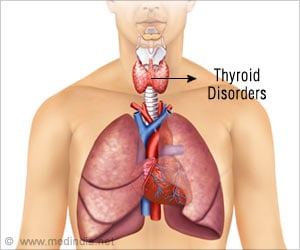The absorption of thyroid supplement levothyroxine is significantly reduced if consumed with a glass of cow's milk.
Highlights
- Levothyroxine is the most commonly used medication, prescribed to replace the natural thyroid hormone thyroxine, which is very low (T4) in hypothyroidism.
- Previous findings have shown that calcium supplements interfere with levothyroxine absorption in the body.
- New findings propose that taking levothyroxine with cow's milk, which contains calcium, interferes with its absorption, suggesting that patients may not get the full dose of thyroid hormone that they are prescribed.
The study is the first to prove that cow's milk, which contains calcium, interferes with levothyroxine absorption.
Levothyroxine is commonly prescribed to replace the natural thyroid hormone thyroxine (T4) that is too low in hypothyroidism where there is the under-activity of the thyroid gland or for patients with thyroid cancer, to suppress their thyroid stimulating hormone levels.
In hypothyroidism, the activity of thyroid gland is decreased and the level of thyroxine hormone in the blood is reduced. Women over 60 years of age are more likely to be affected by this condition.
A few symptoms of hypothyroidism include weight gain, fatigue, heavier menstrual bleeding, depression, elevated blood cholesterol, puffy face, constipation, decreased heart rate and hoarseness of voice.
Study
They had no known thyroid disease and had normal thyroid hormone function at the start of the study. The participants were not allergic to cow's milk or levothyroxine, and none of the women were pregnant or using birth control pills.
The participants had to visit the study center twice, spaced a month apart. They had to fast the night before the visit
During one visit, participants took 1,000 micrograms of oral levothyroxine alone. At the time of second visit, they took the same dose concurrently with 12 ounces of 2% milk.
The blood samples of the participants were tested for T4 levels, before supplementation and one, two, four and six hours after ingestion of levothyroxine.
The levothyroxine absorption was measured as the concentration of total T4 in the blood plotted on a graphic curve against time after drug administration, called area under the curve.
Six hours after taking levothyroxine, participants who consumed milk at the same time as the medicine had significantly lower total T4 absorption compared to when they took the drug alone: average area under the curve of 67.3 versus 73.5.
The manufacturer of a brand of levothyroxine recommends that the medication be taken preferably on an empty stomach, 30 to 60 minutes before eating food or taking other medications or vitamins.
"The main message of this study is that patients managed with thyroid hormone replacement therapy should be advised to avoid taking levothyroxine simultaneously with cow's milk, given its interference," Chon said.
The results were presented at ENDO 2017, the Endocrine Society's 99th annual meeting in Orlando, Fla.
Reference
- Hypothyroidism (underactive thyroid) - (http://www.mayoclinic.org/diseases-conditions/hypothyroidism/home/ovc-20155291)
Source-Medindia
















